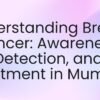Emerging Trends in Cancer Care for 2025
As we approach the end of 2024 and look forward to 2025, the field of oncology continues to evolve at a rapid pace. With new research, technological advancements, and a growing understanding of cancer biology, the landscape of cancer care is changing. This blog post will explore the emerging trends that are set to shape cancer treatment and prevention in 2025, focusing on precision medicine, innovative technologies, and the impact of lifestyle factors.
A few things you should know:
-
1. Advances in Precision Medicine
Precision medicine is at the forefront of cancer treatment innovations. In 2025, we can expect:
Expanded Genomic Profiling: More comprehensive genomic tests will be available, allowing oncologists to identify specific mutations that can be targeted with tailored therapies.
Personalized Treatment Plans: As our understanding of cancer genetics deepens, treatment plans will increasingly be customized based on individual genetic profiles, improving efficacy and reducing side effects.
These advancements aim to provide patients with more effective treatment options that are specifically designed for their unique cancer characteristics.
2. Innovative Early Detection Methods.
Early detection remains a critical factor in improving survival rates. In 2025, we anticipate:
Liquid Biopsies: This non-invasive testing method will become more prevalent, allowing for early detection of cancers through blood samples that identify circulating tumor DNA (ctDNA).
AI-Powered Screening Tools: Artificial intelligence will play a significant role in analyzing imaging data and identifying early signs of cancer that may be missed by traditional methods.
By enhancing early detection capabilities, healthcare providers can intervene sooner, leading to better patient outcomes.
3. Integration of Artificial Intelligence (AI)
AI is transforming various aspects of healthcare, including oncology. In 2025, we expect to see:
Enhanced Diagnostic Accuracy: AI algorithms will assist radiologists in interpreting imaging studies more accurately and efficiently.
Predictive Analytics: AI tools will help predict patient responses to treatments based on historical data, enabling oncologists to make informed decisions about care plans.
The integration of AI into cancer care not only improves diagnostic precision but also streamlines treatment planning processes.
4.Focus on Lifestyle Interventions
Research continues to highlight the significant role lifestyle factors play in cancer prevention and management. In 2025, key areas of focus include:
Nutrition and Cancer Care: Increased emphasis on nutrition as an integral part of cancer treatment plans. Dietitians will work alongside oncologists to develop personalized dietary strategies that support patients during treatment.
Physical Activity Programs: Encouraging regular physical activity as part of survivorship care plans to improve overall well-being and reduce recurrence risks.
By addressing lifestyle factors, healthcare providers can empower patients to take an active role in their health.
5. Telemedicine and Remote Monitoring
The COVID-19 pandemic accelerated the adoption of telemedicine, and this trend is expected to continue into2025.
Remote Consultations: Patients will have greater access to oncologists through virtual consultations, making it easier for them to receive timely care without the need for travel.
Wearable Health Technology: Devices that monitor vital signs and health metrics will become more common, allowing healthcare providers to track patient progress remotely and intervene when necessary.
These innovations improve access to care and enhance patient engagement throughout their treatment journeys.
The future of cancer care is driven by innovation, precision, and compassion. As we step into 2025, every breakthrough in detection, treatment, and patient-centered care brings us closer to defeating this disease and empowering lives.
Conclusion
As we transition into 2025, staying informed about emerging trends in cancer care is essential for patients and healthcare providers alike. Advances in precision medicine, innovative detection methods, AI integration, lifestyle interventions, and telemedicine are all shaping the future of oncology. At Advanced Oncology Clinics in Dadar, Mumbai, we are committed to incorporating these trends into our practice to provide our patients with the highest quality care tailored to their needs.
If you or a loved one has questions about cancer care or would like to learn more about our services as we enter this new era of oncology, please contact us today.



